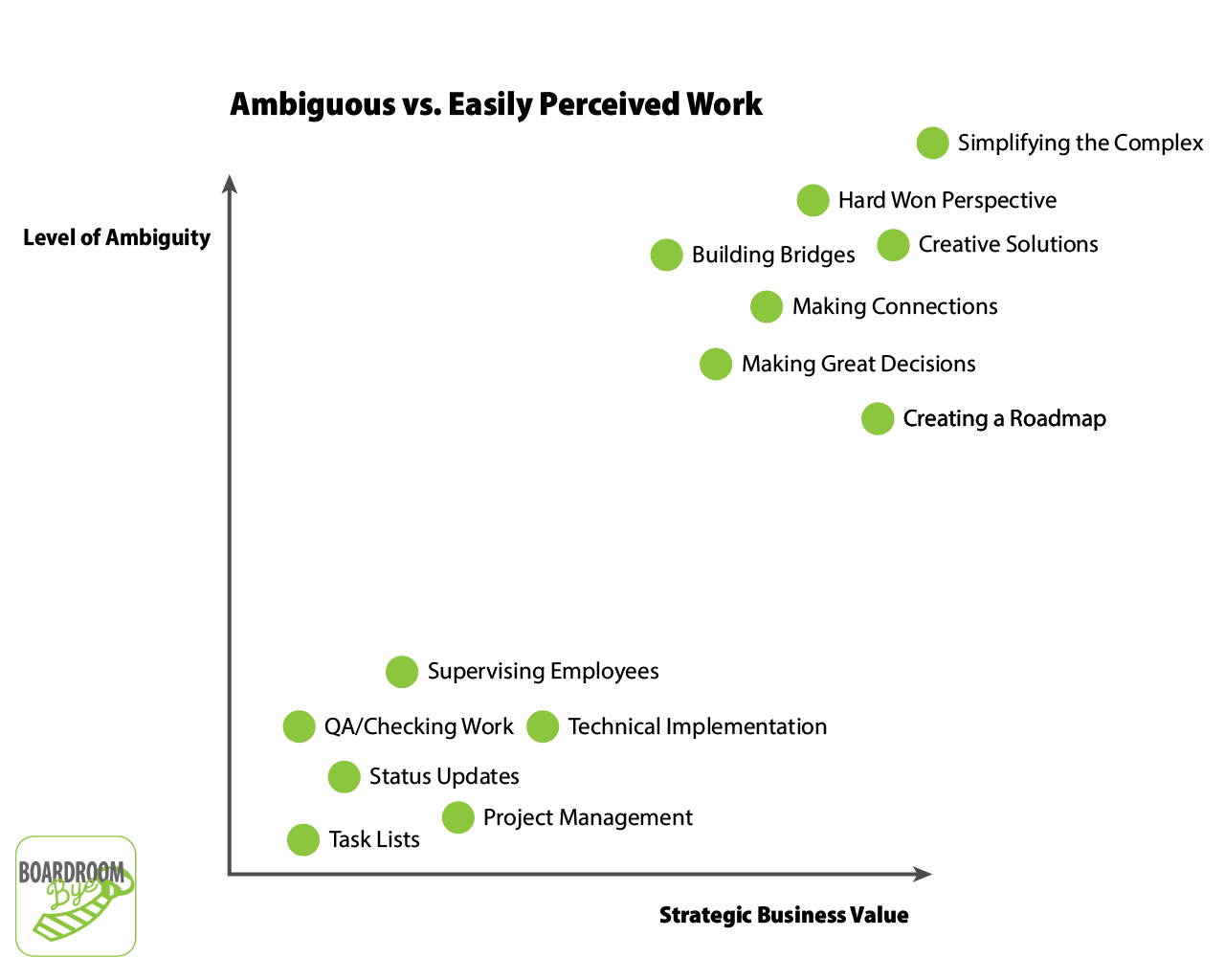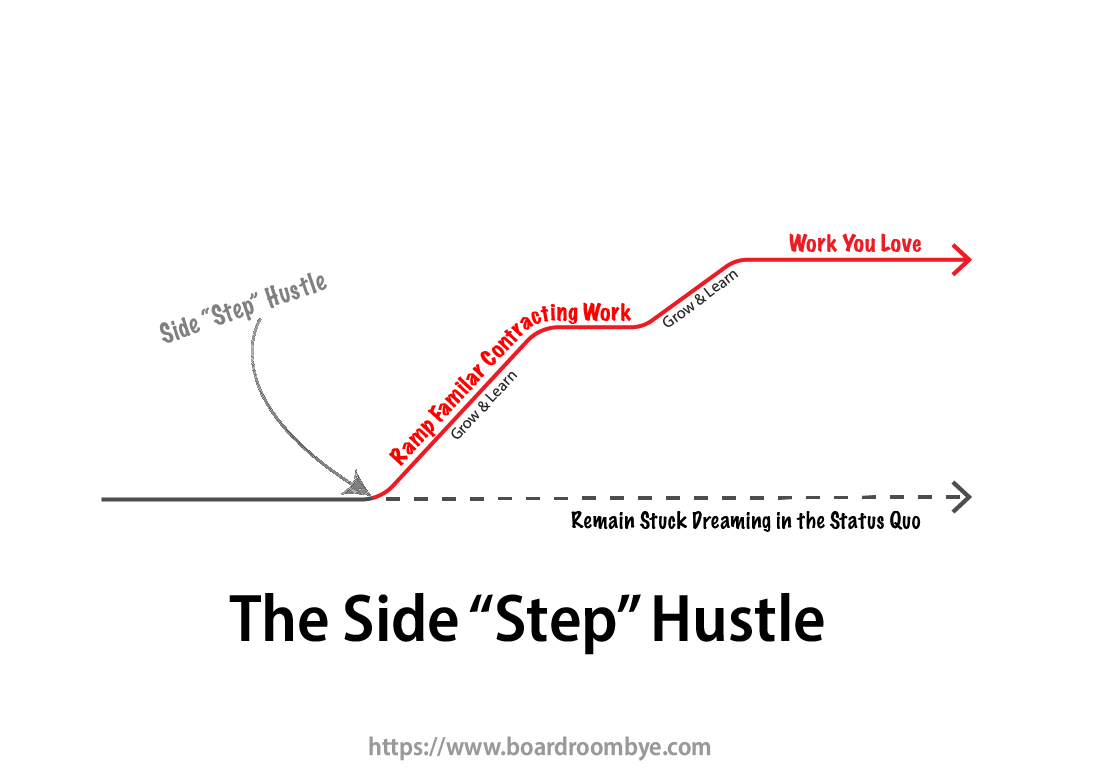Your Superpowers May Be Tough to Productize at First

The further you get into your executive career, the harder it can be to define what your tangible "work" output truly is day in, and day out.
This is generally not a problem for W2 earners going about their day-to-day at a large company, but it may cause a bit of an existential crisis when it comes to figuring out what you have to offer as an independent contractor.
It's a bit of a paradox, right? Work that is HIGHLY visible and easily perceived is typically of lower strategic value. Take project management, for example. Project management is not strategic, nor is it the main value I bring to any project as a consultant. But, it's what clients see and what they often perceive as stuff getting done or value.
Detailed lists, kanban boards, standup meetings, gantt charts, etc. give work an obvious facade that is easy to see but at times an illusion of progress if not combined with higher-value/less-obvious work.
Framing a House is More Than Sawdust & Hammers
A few years ago we built an addition on our house, with the help of a friend as the main contractor. He handled the coordination of multiple subcontractors (including me, that's another story) as well as the ordering of supplies and materials to do the job.
While this timing and coordination of the various contractors might seem like the main value of our friend's contribution as the primary contractor, I noticed something else throughout the job that was his real value: Nimble, creative, and informed decision making when nobody else could figure out what to do.
See, while the framers were rapidly transforming a pile of lumber into a new living space, they'd occasionally hit a snag. Staring at the plans vs. the reality of the emerging structure vs. the existing structure, they'd call my friend over for a real-time decision. Perhaps a utility wall should be built for a shower vs. using the uninsulated ceiling. Perhaps some furring strips had to be made on the spot for the floor joists, and so on. He was there to make relatively quick, highly informed, highly strategic decisions that kept he work going and kept the project on the right path.
Iterative, creative, informed decisions guiding everything was the real value of him being on the project. This continued further on when we went through our various rounds of inspections. End to end creativity and experience made the project a success, not his level of organization or project management.
Ambiguous, Highly Valuable Skills = Superpowers
Whenever find myself spiraling into a "My god what have I done with my career and what value do I have after all these years of management?" whirlpool, I'll try to remember this list of highly valuable, but somewhat ambiguous skills that I bring into any project, role, or engagement that I work on:
- Ability to Simplify: Explaining complex things in a simple, understandable way to stakeholders, vendors, and decision-makers.
- Connection making: Connecting people to create unique solutions. Nurturing connections by being as helpful as possible to as many people as possible over the years. Connecting the dots to pull threads out of conversations and complicated problems.
- Iterative Decision Making: Every successful project is a series of forks in the road. Choosing which fork to take, backed with years of experience, can avoid massive rabbit holes, budget overruns, and scope creep like crazy.
- Seeing a Roadmap: Seeing the forest instead of the trees, boiling down complex, multi-dimensional problems and getting everyone on board with a plan from here to there.
- Building Bridges: Connecting and paving lines of communication and collaboration within companies. Repairing damage between departments and/or employees that haven't been able to see eye-to-eye.
- Creative solutions: Just seeing things another way, finding a window when there's no door. Keeping an open mind on the business goal vs. any legacy process or assumptions. There are usually 10 ways to solve a problem and 2-3 that are really great solutions.
Again, this stuff is all great but it's really hard to productize and quantify. Sure, there are established management consulting firms and "Midas touch" coaching legends that can charge whatever they want for a chance to be in the presence of their greatness and hear their royal pontifications, but that's not realistic for someone just starting out.
The More "Obvious" Work is Really a Lever.
As we build a business and productize our offerings, then, we simply need to wrap high-value/highly ambiguous work with low-value/highly obvious work.
Since we can't get away from it, goal must be to get the lower-value work off your plate ASAP. If you're anything like me, this is also the work you're not great at anyway. So, it's a win/win to hire for your weaknesses as well in this case.
In some cases, the obvious part of the work is code or a manufacturing process. This would be the case in a web application or durable good.
In consulting or any service-based offering, the obvious part of the work is what productizes the service, gives it a tangible facade, and allows it to scale.
So, what obvious work is your business idea or service missing? How could it be outsourced or hired for? How can that obvious work shine a brighter light on your superpowers?





